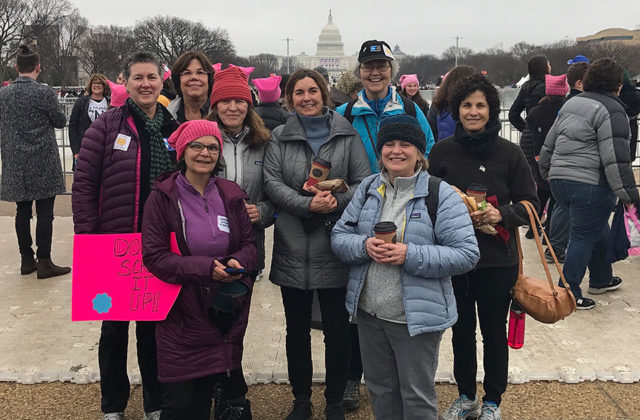Norfolk Represented in Women’s March on Washington
Residents travel to D.C believing nation’s moral values threatened
By Lindsey Pizzica Rotolo
At least 20 Norfolkians travelled to Washington, D.C.—by car, bus, train and plane—on January 21 for the Women’s March. Two separate, large groups of Norfolk women were never able to meet up at the march but shared a very similar experience.
The first group included Kailyn Nadeau, Ginger Coleman-Prisco, Sara Heller, Jordan Rose Lee, Katherine Vandiver and Anita Holmes. The second group consisted of Jude Mead, Patty Platt, Barbara Spiegel, Susannah Wood, Trish Deans, June Peterson, Molly Peterson, Jan Graham-Jones and Kate Wenner. They met up with Ann Havemeyer, who was there with her sisters and one of her daughters. The Norfolk attendees were mostly organized by a Facebook page, “Norfolk CT Women/Men Attending Million Women’s March.”
“There were so many people there,” shared Jude Mead. “We just weren’t prepared for that.” Neither was the city of Washington, apparently. The sound systems and video screens live-streaming the events on the main stage were only set up for the first couple blocks from the center of the action (on Independence Avenue between 3rd and 4th Streets), but crowds spilled out for at least half a mile in every direction.
One of the groups never got close enough to hear the speakers but didn’t feel that took anything away from their experience. “It was just amazing to be there, reading people’s signs, talking to everyone around you…it was the best people-watching experience,” says Coleman-Prisco.
“It was the most amazing thing I have ever experienced,” said Mead. “Everyone there was kind and protective of each other, but there was a force, some kind of strong energy linking us all together that was just incredible.”
“I had no idea it would spread to other cities, so I flew all the way back here from L.A. to take part,” says Patty Platt, who divides her time between Norfolk and California. She flew down to D.C. with Mead, Spiegel and Graham-Jones. They met up with Wenner, Deans and Wood on Saturday morning.
The women were impressed with how the city handled the marchers. The police presence was minimal, at best—some Norfolk women never saw a cop, while others reported that the few they saw were very friendly and supportive. A few others reported seeing national guardsmen.
Barbara Spiegel was struck by how clean the city was. “Every trash can was spilling over, but people were just neatly stacking their trash next to the trash cans. It was just incredible how conscientious everyone was.”
The Women’s March began as a small, grassroots organization, but quickly went viral. Its mission statement reads, in part, “In the spirit of democracy and honoring the champions of human rights, dignity, and justice who have come before us, we join in diversity to show our presence in numbers too great to ignore.”
That resonated particularly strongly with Ann Havemeyer, whose grandmother, Louisine Havemeyer, literally carried the torch for the suffrage cause exactly 100 years ago. Ann Havemeyer was quoted as saying, “How could I do less with such examples before me?,” a sentiment Louisine probably never imagined would ring as true with her future descendants as it did for her in the early 1900s. “For me,” says Havemeyer, “this march was about core human values and celebrating diversity more than politics.”
As for “numbers too great to ignore,” that goal was certainly achieved. Only 200,000 people registered for the Washington, D.C. march, but some estimates put the number of attendees around the half-million mark. It is estimated that another five million people attended the march worldwide.
The Women’s March organization calls for 10 actions in 100 days following the march, but only outlines the first action on their website—a postcard campaign. The group urges people to send postcards about the issues of greatest concern to their senators. The Norfolk group of marchers is planning a postcard writing party, but no date has been set yet for that event.
Of greatest concern for the Norfolk women interviewed for this article are: our country’s moral tradition being threatened, Trump’s nominee to replace the late Associate Justice Antonin Scalia, the rights of the LGBTQ community, the likely repeal of the Affordable Care Act, the nomination of Betsy DeVos for Secretary of Education, changes to immigration policies and an overall fear of the “alt right” being the “new normal.”
Photo by Molly Peterson. Norfolk attendees to the Women’s March stand with the U.S. Capitol behind them. Back row, from left: Barbara Spiegel, Patty Platt, Trish Deans, Jude Mead, Susannah Wood, Kate Wenner. Front row: June Peterson, Jan Graham-Jones.

